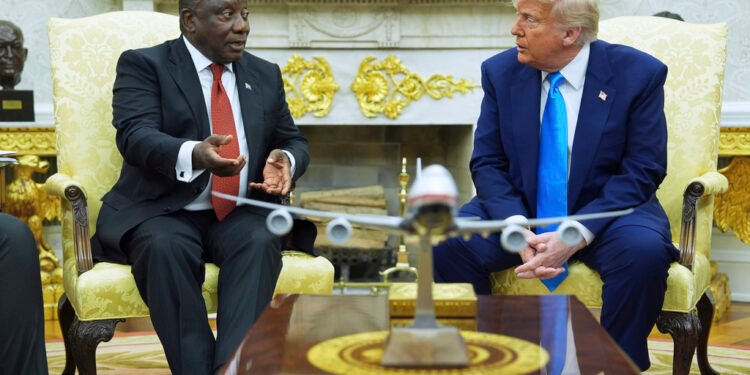JOHANNESBURG/ NEW DELHI/ WASHINGTON D.C — A local official in South Africa has condemned U.S. presidential candidate Donald Trump for misrepresenting a tribute to a murdered farming couple as evidence of mass killings of white South African farmers — reigniting a long-discredited racial narrative that has drawn global criticism in the past.
During a press briefing at the White House on Wednesday — held after Trump’s meeting with South African President Cyril Ramaphosa — the former president displayed drone footage showing rows of white crosses along a rural road, claiming they were “burial sites” for over 1,000 white farmers allegedly killed in a so-called “white genocide.”
“I showed this to President Ramaphosa because the world needs to know what’s happening to white farmers,” Trump said. “They’re being wiped out. It’s a tragedy nobody talks about.”
But the footage, verified by Reuters as having been filmed near the town of Newcastle in KwaZulu-Natal in 2020, showed a memorial tribute to a single white farming couple — Glen and Vida Rafferty — who were murdered in their home. The white crosses, placed temporarily along the road to Normandien for a public procession, were not graves and were never intended to symbolize the scale of farm murders.
Local Response: “It’s Being Used Politically”
Bebsie Cronje, a ward councillor in Newcastle and a member of the Democratic Alliance, said she was “saddened” by the political misuse of what was meant to be a personal and community-driven act of mourning.
“The crosses were not a display of how many farm murders occurred. It was a tribute to the Raffertys,” Cronje said. “It’s very sad that something like this is being used politically.”
She confirmed the tribute was organized by friends and neighbors, and not as a racial or political statement. The long convoy seen in the video was a show of solidarity from the farming community, not evidence of systemic violence.
Government Response: No Evidence of White Genocide
South Africa’s Police Minister Senzo Mchunu, responding to the video in a separate press briefing on Friday, firmly denied any systemic targeting of white farmers.
“The Raffertys were sadly murdered by criminals in their home. Three suspects were arrested and are serving sentences,” Mchunu said. “The crosses were a symbolic act by the community — not graves. And claims of a white genocide are unfounded and unsubstantiated.”
According to official crime statistics, six farm murders were recorded in the first quarter of 2025 — only one involving a white victim. Over the same period, South Africa recorded 5,727 murders, most of them affecting Black communities, particularly in high-crime urban areas.
“The history of farm murders in this country has always been distorted,” Mchunu added. “African farm workers and smallholders have consistently been victims too — often in greater numbers.”
Historical Context: Trump’s Longstanding Narrative
Trump has previously echoed similar claims. In 2018, as president, he tweeted that he had asked then–Secretary of State Mike Pompeo to investigate “land and farm seizures and the large-scale killing of farmers” in South Africa — prompting a diplomatic protest from Pretoria. The tweet was widely condemned by human rights organizations and fact-checkers for promoting a debunked white nationalist conspiracy theory.
Despite official data refuting claims of racial targeting, the “white genocide” narrative remains a recurring theme in far-right and white supremacist circles in the U.S., Australia, and parts of Europe. Its reappearance at the White House underscores how misinformation rooted in racial fear continues to be weaponized for political gain.
Analytical Perspective: Race, Politics, and Global Misinformation
The controversy highlights how powerful political figures can repurpose isolated tragedies into racially charged narratives — often aimed at energizing domestic bases or shaping foreign policy posture. By reviving the white genocide trope, Trump not only misrepresents South African realities but also taps into deeper racial anxieties in Western societies about demographic change and perceived victimhood.
Dr. Shahid Siddiqui, a geopolitical analyst, notes that “the use of this imagery reflects more on U.S. racial politics than on South African realities. It speaks to a broader trend of Western political figures instrumentalizing events in the Global South to stoke domestic identity politics.”
The broader danger, experts warn, is how such narratives can undermine international cooperation, fuel xenophobia, and obscure the real, complex roots of violence in rural South Africa — which include poverty, labor tensions, and criminal syndicates, rather than state-sanctioned racial targeting.
Media and Political Responsibility
Cronje added that while another white farmer was recently killed in Newcastle, she does not believe the incidents are racially motivated.
“I can’t say it’s just white people. If a Black farmer is killed, it doesn’t come to the news,” she said.
Her statement points to an enduring media imbalance: crimes against Black rural dwellers and farm workers — often in far greater numbers — rarely gain similar international coverage. Analysts say this skew fuels a distorted picture of racial violence in post-apartheid South Africa, where economic inequality, not racial targeting, remains the primary driver of rural crime.
Memory Hijacked by Misinformation
What began as a heartfelt tribute to a grieving community has been transformed into global political fodder. In doing so, it risks not only dishonoring the memory of the Raffertys but also reinforcing a narrative that is factually incorrect and socially divisive.
As South Africa prepares for upcoming elections and the U.S. enters a turbulent campaign cycle, the intersection of misinformation, race, and geopolitics is once again proving both potent — and dangerous.
–By Nellie Peyton | Additional analysis by Dr. Shahid Siddiqui
WATCH, LIKE and SUBSCRIBE CHANNEL FOR REGULAR GEOPOLITICAL DEVELOPMENTS





















